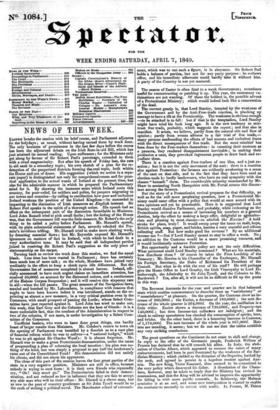NEWS OF THE WEEK.
EASTER breaks the session with its brief recess, and Parliament adjourns for the holydays ; as usual, without having earned them by work done. EASTER breaks the session with its brief recess, and Parliament adjourns for the holydays ; as usual, without having earned them by work done.
The only business of prominence in the last few days before the recess has been the adjourned debate on the Irish Rate-in-aid Bill, which has just attained its second reading. Upon sufferance; for the Ministers only get along by favour of Sir Robert Peel's patronage, extended to them with a cruel magnanimity. But after his speech of Friday last, the rate in aid sank to a secondary topic; his own sketch of a plan for the re- demption of the pauperized districts forming the,real topic, both within the House and out of doors. His suggestion (which we notice in a sepa- rate paper) is distinguished not only for comprehensiveness and for prac- tical application to the actual wants of Ireland at the present time, but also for the admirable manner in which he prepared the Parliamentary mind for it. By showing the immense sums which Ireland costa this country, for poor-relief, for soldiers and police, for paupers migrating to our towns and counties—by calling to recollection how poor and turbulent
Ireland weakens the position of the United Kingdom—he succeeded in imparting to the discussion of Irish measures an English interest. Sir
Robert Peel speaks in the spirit of a thorough union. His speech had an effect on the subsequent part of the discussion formidable to Ministers. Lord John Russell tried to pick small faults ; but the feeling of the House was, that the Government bill was the little measure, Sir Robert's the on/y thing to be called a policy before Parliament. Mr. Monsell's speech, with its plain substantial statements of fact, severely rebuked the Pre- mier's invidious trifling. Mr. Disraeli tried to make more slashing work, by detecting essential flaws ; but Mr. Reynolds exposed Mr. Disraeli's ignorance on matters of fact in Ireland, with which he had dealt in a very authoritative tone. It may be said that all independent parties joined in receiving Sir Robert Peel's suggestion as the only piece of statesmanship on the carpet.
Turning back to review the work done this session, we find the usual blank. Less time has been wasted in Parliament ; there has certainly been much less of mere talk ; on the whole, Members have joined very creditably in the effort to keep a check upon idle diffuseness. But the Government list of measures completed is almost barren. Ireland, offi- cially announced to have such urgent claims on immediate attention, has received 50,0001. on account for the distressed unions, and a continuance of the Habeas Corpus Suspension ; and it will receive this sixpenny rate
in aid—when the bill passes. The great measure of the Navigation-laws,
mauled and botched by Mr. Labouchere, in compliance with reasons that ought to have been known before it was introduced, stands on the re-
printing as almost a new measure, in a very critical position even in the Commons, with small prospect of passing the Lords; whose Select Com- mittee have just reported against it. Lord John has tried to make out, this week, that Earl Grey and the Colonies are the best of friends : it is a more undeniable fact, that the conduct of the Administration in respect to two of the colonies, if not more, is under investigation by a Select Com- mittee of the Commons.
Unofficial leaders, who were to have done great things, can hardly boast of larger results than Ministers. Mr. Cobden's return to town on
the opening of Parliament was heralded by a flourish as to a vast plan of financial reform which lie was to enforce—a "national budget," which he was to pit against Sir Charles Wood's : it is almost forgotten. Mr. Disraeli was to make a great Protectionist demonstration, under the name of propounding a plan of reforming the local taxation : his plan was no- thing of the kind, but was simply a proposal to pay half the landowner's rates out of the Consolidated Fund! His demonstration did not satisfy his clients, and did not alarm his opponents.
The close of this part of the session leaves the four great parties of the state in a very negative position. Ministers are still in office, because
nobody is trying to oust them: it is their own friends who repeatedly cry, " Oh ! they must go." The Protectionists failed in their demon- stration, and are reduced so low in influence that they are fain to accept any able man who will be their officer : Mr. Disraeli is a clever man, but as new to the post of country gentleman as Sir John Tyrell would be to the craft of writing a political novel. The Manchester school of retrench-
ment, which was to out such a figure, is in abeyance. Sir Robert Peel holds a balance of parties, but not for any party purpose : he eschews office, and his immediate adherents could hardly take it without him. A party of the Country is not yet matured.


























